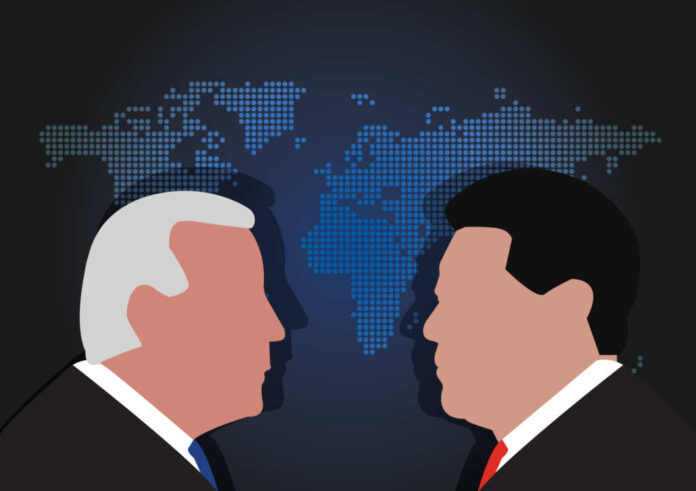
As Biden exits stage left, world leaders cozy up to China’s Xi Jinping in a desperate bid for ‘stability’
In a shocking turn of events, global leaders are falling over themselves to court China’s favor as Joe Biden’s presidency comes to an end. With Donald Trump set to take the reins once again, figures like Britain’s Keir Starmer and Australia’s Anthony Albanese are scrambling to establish ‘stable’ relations with the communist regime. Meanwhile, Xi Jinping is playing the long game, positioning China as a beacon of open trade and stability. But as the world’s focus shifts eastward, one can’t help but wonder: Are we witnessing the decline of American influence on the global stage?
The Great Diplomatic Shuffle
As the curtain falls on Biden’s presidency, world leaders are engaging in a frantic diplomatic dance with China’s President Xi Jinping. British PM Keir Starmer and Australian PM Anthony Albanese are leading the charge, emphasizing the need for stable relations with the communist giant. This sudden pivot comes as Biden’s attempts to avoid conflict with China give way to the looming reality of a Trump presidency. The irony is palpable – as America’s leadership stumbles, China’s Xi is positioning his nation as a bastion of open trade and stability at the G20 summit.
But let’s not kid ourselves. This isn’t about genuine friendship or shared values. It’s about fear, plain and simple. These so-called leaders are terrified of what a Trump presidency might mean for their cozy relationships with Beijing. They’re scrambling to secure their own interests, even if it means cozying up to a regime with a track record of human rights abuses and aggressive territorial expansion.
The Taiwan Tightrope
At the heart of this diplomatic minefield lies Taiwan, the democratic island nation that China sees as its own. For decades, the U.S. has maintained a policy of “strategic ambiguity” regarding Taiwan, a clever dance designed to keep both Taiwan and China guessing. But as China flexes its military muscles in the region, some experts are calling for a shift to “strategic clarity” – a clear statement of America’s intentions to defend Taiwan.
“Taiwan’s defense capability relative to that of the PRC will be maintained” – President Ronald Reagan
This quote from Reagan highlights the longstanding U.S. commitment to Taiwan’s security. But as China’s power grows and America’s resolve wavers, how long can this commitment stand? The experts are now suggesting we rename our “One China” policy to a “cross-Strait” policy. Because apparently, changing the name will magically solve all our problems. It’s like putting a band-aid on a bullet wound and calling it a day.
Southeast Asia: The New Battleground
While the world’s attention is focused on Taiwan, a quieter but equally significant shift is happening in Southeast Asia. Over the past three years, this region has seen major leadership transitions, each with its own impact on relations with China. The Philippines, once cozying up to Beijing, has now shifted towards the U.S., thanks to China’s aggressive actions in the West Philippine Sea. It’s almost as if bullying your neighbors doesn’t win you many friends. Who knew?
On the flip side, Malaysia under Prime Minister Anwar Ibrahim has strengthened ties with China, supporting initiatives like the Belt and Road Initiative. Anwar even went as far as to dismiss concerns about China’s influence as “Chinaphobia.” Because apparently, being wary of a totalitarian regime with a history of economic coercion is just irrational fear. Give me a break.
The Consequences of Appeasement
As world leaders bend over backwards to appease China, it’s worth considering the long-term consequences of this strategy. The U.S.-China relationship is arguably the most consequential for America, with China posing both existential and systemic threats. We’re talking about a nation with a nuclear arsenal capable of erasing the U.S. from the map. This isn’t a game of Risk; it’s a real-world scenario of mutually assured destruction.
Lee Kuan Yew’s prescient words highlight the inevitability of China’s ambitions. As we watch world leaders kowtow to Xi Jinping, it’s clear that China is well on its way to achieving its goal of global dominance. And what are we doing about it? Restarting communications and having photo-op meetings to “demonstrate cooperation.” It’s like bringing a knife to a gunfight and calling it diplomacy.
The Road Ahead
As we stand at this crossroads of global politics, the path forward is fraught with danger. The weakening of U.S.-China ties is expected to continue, with both countries focusing on de-risking their economies and pursuing different world orders. But let’s be clear: this isn’t just about economics or politics. This is about the future of freedom, democracy, and human rights on a global scale.
The G20 summit marks the end of Biden’s international advocacy and a new focus on China in global diplomacy. As Trump prepares to retake the White House, the world holds its breath. Will he stand up to China’s aggression, or will he too fall into the trap of appeasement? One thing’s for certain: the outcome of these diplomatic efforts remains uncertain, with potential disappointments for China’s supporters.
In the end, it’s up to us – the American people – to demand leadership that puts our interests first. We need a president who won’t bow to Chinese pressure, who will stand up for our allies, and who will fight for American values on the world stage. The alternative is a world where China calls the shots, and freedom becomes nothing more than a distant memory. Is that the future we want for our children? I think not.














